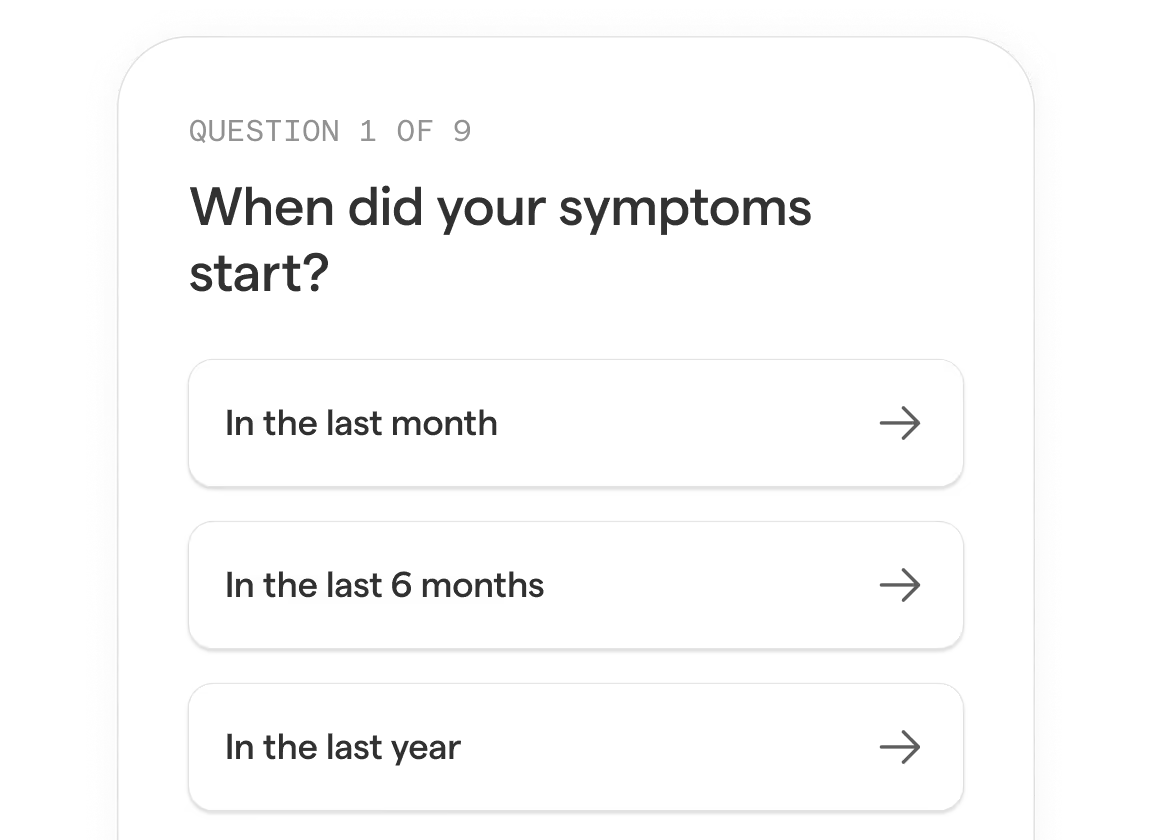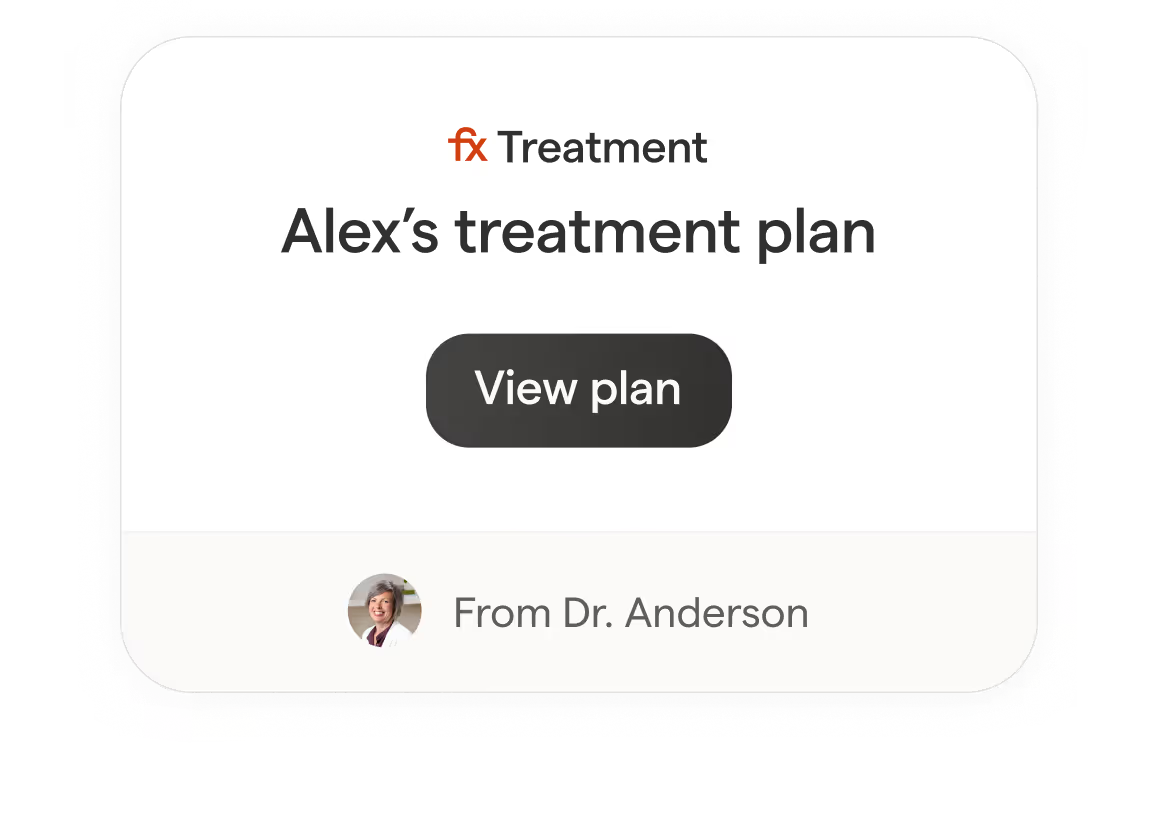Download the Felix App
Earn reward, visit our shop and get exclusive offers on the app
Download now

With Felix, you can get Omeprazole prescribed by a licensed healthcare practitioner and delivered to your door for free.
Omeprazole is a medication belonging to the Proton Pump Inhibitor (PPI) family of drugs. Omeprazole’s primary indicated use is to treat issues that are being caused by your stomach producing too much stomach acid.
APO-Omeprazole is the brand name for this medication, but simply Omeprazole is also the generic name for this medication. Regardless which brand name it’s under, Omeprazole will contain the same active ingredients.
If you’d like to learn more about how Omeprazole prescriptions function or the ways that this treatment can be helpful, click here for more information.
As part of the Proton Pump Inhibitor (PPI) family of drugs, Omeprazole works by helping to reduce the amount of stomach acid that your body produces.
Specifically, it inhibits the secretion of both basal acids, as well as stimulated acid secretion (brought on by meals, etc.).
Through this, Omeprazole can help heartburn, GERD, and other acid-related symptoms and conditions.
There are a few different conditions that Omeprazole can be used to treat, such as:
In addition to using Omeprazole for GERD, acid reflux, etc., practitioners may suggest using this treatment to manage the symptoms of acid reflux that can impact your life. For example, they may suggest Omeprazole for heartburn and regurgitation management.
It’s always important to remember to take your Omeprazole dosages exactly as prescribed to you by your practitioner, in order to achieve the maximum efficiency from your Omeprazole treatments.
If you’re wondering, “can I take Omeprazole after eating?”, this medication can be taken with or without food. It’s best to take it 30-60 minutes before breakfast for maximum effect. You should always take your medications with a liquid though, to ensure it’s properly ingested.
Should you miss a dose of Omeprazole, try to take it as soon as you remember, unless it’s getting close to your next dosage. In this scenario, you should skip the missing dose.
NEVER double-up on your Omeprazole medication, as overdoses could potentially occur. If an overdose of Omeprazole occurs, you’ll need to seek immediate medical attention.
For those curious, “how long does Omeprazole take to work?”. Omeprazole starts to work within the first hour or so of you taking your daily dosage, and it reaches its peak state around 4 hours after its ingestion.
Omeprazole medications have a terminal half-life of only 40 minutes, and are excreted by the body through natural functions (urine and feces) each 24 hour period. However, repeated use has shown to provide scalable absorption of the medication during each dosage, until the fourth day of consecutive use when it reaches its maximum level.
If you want to get the most out of this treatment, you must follow your practitioner’s dosing schedule precisely, and take Omeprazole for as long as your practitioner deems it necessary to achieve your health goals.
Like many medications, Omeprazole dosages may cause side effects in some patients, but in many cases, these side effects of Omeprazole will be mild, and they may lessen or disappear as your body adjusts to the treatment. Meaning you may notice less Omeprazole side effects in long-term treatments, once you’ve been on the medication for a few weeks.
With that in mind, the most commonly occurring side effects of Omeprazole prescriptions include:
If any of these side effects of Omeprazole begin to become severe or start to impact your daily quality of life, be sure to let your practitioner know. They may be able to suggest alternative medications to Omeprazole without interactions or negative side effects.
There are a variety of patients that shouldn’t use dosages of Omeprazole for GERD, acid reflux, etc. These people include:
In addition to these patients, there are other people who should be extra cautious about using Omeprazole for heartburn, GERD, etc. This includes people who:
There are also a wide range of medications (prescription and over-the-counter), which may cause negative interactions with Omeprazole. Be sure to let your practitioner know about any/all medications or treatments you’re taking, even if some don’t require a prescription to acquire.
If there are potential negative interactions with Omeprazole between the other medications that you’re currently taking, your clinician may be able to suggest alternatives to Omeprazole without the interactions, or at least, a lower risk of occurrence.
There are no studies that provide detailed information regarding the interactions between Omeprazole for babies or children, as well as whether this medication can transfer to children in the womb or through breastfeeding.
Because of this, Omeprazole is not considered safe in pregnancy. If you’re pregnant, planning to become pregnant, breastfeeding, or planning to breastfeed, be sure to let your practitioner know before you request an Omeprazole prescription online in Canada from Felix.
Prescriptions for Omeprazole relieve acid reflux symptoms by helping to regulate and reduce the amount of stomach acid that your body naturally produces, both after eating and between meals.
With less acid in your stomach, it’s easier for your body’s natural defenses against acid reflux symptoms to prevent symptoms from occurring, and the symptoms that do still occur may be less severe.
You can even improve the effectiveness of using Omeprazole for heartburn, GERD, etc., by making certain lifestyle adjustments (i.e., eat meals 2-3 hours before bed, avoid trigger foods, etc.).
Further reading








The first step you must take in order to be able to get an Omeprazole prescription online in Canada with Felix is to complete a short online assessment, at your convenience.
Once you’ve submitted your assessment, one of our practitioners will get back to you, typically within 24 hours. If they believe that an Omeprazole prescription could be right for you, based on your health, needs, and medical history, they can provide you with one.
Then, Felix and our pharmacy partners can fill and ship your Omeprazole medications directly (and discreetly) to your doorstep, at no extra cost to you! We can even arrange for future Omeprazole refills to be delivered automatically, before you run out.
This way, you’ll always have your medications on-hand when you really need them. It’s just another way we’re helping Canadians take back control of their health and quality of life.
There’s no way for Felix to answer this question generally, because every private insurance provider and benefits plan will look different from one another.
We’d suggest that you reach out to your insurance representative directly, before submitting your request to get Omeprazole online in Canada from Felix. This way, you can provide your applicable insurance information (if any) to your clinician during the assessment process.
If you do have coverage, Felix is happy to bill your insurer directly for you, so that we can save you the time and trouble of managing that part of the process yourself.
The same type of response applies to provincial health plan coverage, because every province is going to have a different list of medications that they provide coverage for, as well as eligibility criteria that must be met for each. What’s available in one province, may not be in others.
You should check to see what the benefits available and guidelines for eligibility are in your region of the country, prior to submitting your request with Felix. Depending on where you look to buy Omeprazole in Canada, you may be able to find coverage you would have otherwise overlooked.
Yes, it’s safe to order Omeprazole online in Canada when you choose to go through Felix.
Our team of skilled licensed healthcare practitioners are experienced and well-versed in a wide array of conditions and ailments that they can provide guidance and treatment suggestions about.
We’re licensed to provide prescriptions for all of the medications that we offer our patients, and our pharmacy partners are certified to fill and ship essential prescriptions across Canada.
When you choose to go with Felix, you’re not only getting informed guidance and support, you’re also getting the peace of mind that every part of our services is as safe, fast, and accessible as possible.
If you’ve been wondering where to buy Omeprazole in Canada, it’s time you considered Felix.
In addition to the wide range of different ailments and treatments that we offer our patients, Felix has many reasons to choose us for your online Omeprazole orders in Canada.
Convenience is one of our biggest benefits, since not only can you complete your assessment from the comfort and privacy of your own home, but we’ll have your treatments delivered directly (and discreetly) to you, at no extra charge.
This means no more afternoons sitting around crowded doctor’s offices, or standing in neverending lines at the pharmacy just to pick up your prescribed medications. Plus, we can even arrange for Omeprazole refills to be automatically delivered when you need it.
With versatile, affordable treatment options for all of our patients across Canada, and our ever-growing list of services, Felix can help you take back control of your health and happiness, so that you can get back to living life on your terms - the way it should be!
Felix is Canada’s first truly integrated healthcare platform. We provide on-demand treatment for everyday health needs like weight loss, mental health, sexual health, and more. Founded in 2019, our digital-first approach to healthcare includes everything from diagnosis to prescription — all accessible from the comfort of home.
No. Felix provides a faster, hassle-free way for you to get a treatment plan for certain conditions, but our service does not replace your primary care provider. For matters that extend beyond obtaining a lifestyle treatment safely and easily, we encourage you to consult your primary health practitioner in person — whether for checkups, personal health concerns, or to inform them about your current treatments or treatment plans.
Absolutely. Our online assessments have been designed to ask all the necessary questions required for diagnosis. We've worked with specialists to create an assessment process that can provide sufficient information for the healthcare practitioner to determine whether or not you are eligible for a prescription and craft an appropriate treatment plan.
Call 911 or proceed to your nearest emergency room immediately. Felix is not intended for medical emergencies. Once the emergency has been addressed or resolved, contact your prescribing practitioner to inform them of your experience as this may impact your current treatment plan.
Anyone who is 18 years or older (16 or older for acne and birth control prescriptions), and is located in Alberta, British Columbia, Manitoba, Newfoundland and Labrador, Nova Scotia, Prince Edward Island, Saskatchewan or Ontario. We cannot ship treatments outside of these provinces at this time.
After creating an account, you will complete a medical assessment for evaluation by one of the Felix healthcare practitioners.
During your assessment, you will have the opportunity to send your practitioner questions via secure messaging.
In most cases, practitioners will complete your assessment with secure messaging alone but sometimes they may determine you require an audio or video visit and/or further diagnostic testing to help determine the best treatment plan for you.
If your practitioner has determined a prescription treatment is appropriate, they will approve your visit and write you a prescription. Our pharmacy will then ship your prescription to your home.
You’ll be able to message your healthcare practitioner if you have questions or want to make changes to your treatment at any time.
No. We use an asynchronous telemedicine model so you can complete your online visit in your own time and we save your progress so you can come back later to finish it.
If you are completing a visit in the mental health or weight loss categories, your healthcare practitioner may require a phone or video call to discuss your medical profile further during the assessment process.
Most assessments do not require a phone or video conversation. Once a prescriber has reviewed the info in your assessment they will respond to you via secure instant messages that you can access within your Felix account.
If you are completing a visit in the mental health or weight loss categories, your healthcare practitioner may require a phone or video call to discuss your medical profile further during the assessment process.
You can expect to receive a response from a healthcare practitioner within 24 hours of submission. If you’ve been waiting longer than this, please reach out to our Patient Support team through the chat bubble in the bottom right corner of your account or our Contact Us page.
No. A visit with a licensed healthcare practitioner is required for all treatments currently provided through Felix’s service.
Not long. After completing your assessment, a practitioner will generally respond within 24 hours, and often much sooner.
Treatment plans will be processed within 2-4 business days of your approval date if there is nothing blocking fulfillment.
All packages usually takes 2-3 business days. You will receive an email with your tracking number once your treatment has been shipped.
Absolutely. All Felix shipments arrive in a nondescript blister package so you can have your treatment shipped wherever makes sense for you as long as there is someone there to sign for it.
A signature upon delivery may be required.
There is currently no cost to have your treatment shipped to you from our Felix Pharmacy network.
Yes, your security is paramount to Felix’s mission. Personal health information provided during your medical assessment is strictly and legally confidential between you and the Felix healthcare practitioner.
Beyond that, all your account information (including the medical assessment, credit card, and shipping information, etc.) is also stored safely and securely. Felix is compliant with all federal and provincial health privacy legislation. It is our duty to protect your data with comprehensive security infrastructure and stringent data policies to ensure it stays private and secure.
Read more on our Privacy Policy.
Yes! In Canada, only a licensed healthcare practitioner can write a prescription, and only a registered pharmacist can fill that prescription. We are supported by leaders in the Canadian pharmacology and specialized medical fields. Felix adheres strictly to all the regulations set forth by all applicable Colleges of Pharmacists and Colleges of Physicians and Surgeons in which we operate.
Absolutely. All prescriptions obtained via Felix are provided by licensed Canadian healthcare practitioners—the same as you would get at a hospital, doctor’s office, or clinic. These practitioners do not provide prescriptions unless they deem it medically safe and appropriate to write them based on your medical profile and assessment answers. Our assessments have been crafted by the practitioners on our medical team. Finally, all Felix Pharmacies are provincially accredited just like any retail pharmacy.
Your privacy is our top priority. All your data is 256 bit SSL/TLS encrypted, and we take significant steps to keep your data secure. You can read our Privacy Policy for more information.
Felix charges a fee for the online visit. In most cases the fee is $40 but varies by treatment category. The visit fee includes a prescription valid for up to a year (depending on the condition) and on-going support from the healthcare practitioner or pharmacist.
It depends. Treatment costs vary but will be in line with what you would pay at a pharmacy in person. You will see the estimated cost of your treatment before insurance, during the online visit but will only be billed for medication costs for your prescription once it is approved and sent to our pharmacy. Once approved, your treatment and payment will be processed within one to two days.
Keep in mind that you won’t necessarily need to pay the full price yourself. If you have insurance, Felix’s partner pharmacies will bill your insurer directly. You may also be eligible for financial support in your province.
We accept all major credit cards for any aspect of your treatment not covered by insurance or other financial support
Treatment coverage varies greatly between different insurance plans.
The good news is that if you are covered, Felix can bill your insurer directly, and then process your treatment plan at no additional cost to you. We recommend that you upload your private and/or provincial benefit card during the online visit so that our pharmacy partner can apply any coverage you are eligible for before processing your treatment plan.
Insurance coverage for treatment plans through Felix doesn't include the cost of your visit.
A Felix online visit is considered asynchronous since it is conveniently completed through a secure chat bases system. Currently, asynchronous visits are not covered by insurance or provincial health plans so you will be charged a visit fee, depending on the category of treatment you are requesting.
Medication coverage varies greatly between different plans, provinces, and has specific criteria that determine eligibility. For private insurance, we recommend contacting your benefits administrator with your details and the Drug Identification Number (DIN) and the drug name to determine your coverage.
For more details on provincial health plan coverage see below:
Alberta: Learn more about AHCIP here. Search for covered drugs here.
British Columbia: Learn more about MSP here. Search for covered drugs here.
Manitoba: Learn more about MHSIP here. Search for covered drugs here.
Newfoundland and Labrador: Learn more about MCP here. Search for covered drugs here.
Nova Scotia: Learn more about MSI here. Search for covered drugs here.
Ontario: Learn more about OHIP+ here. Search for covered drugs here.
Prince Edward Island: Learn more about Health PEI here. Search for covered drugs here.
Saskatchewan: Learn more about Saskatchewan Health Coverage here. Search for covered drugs here.












